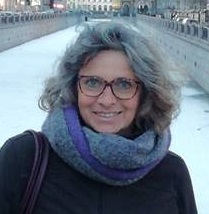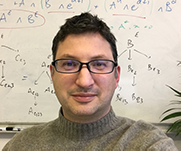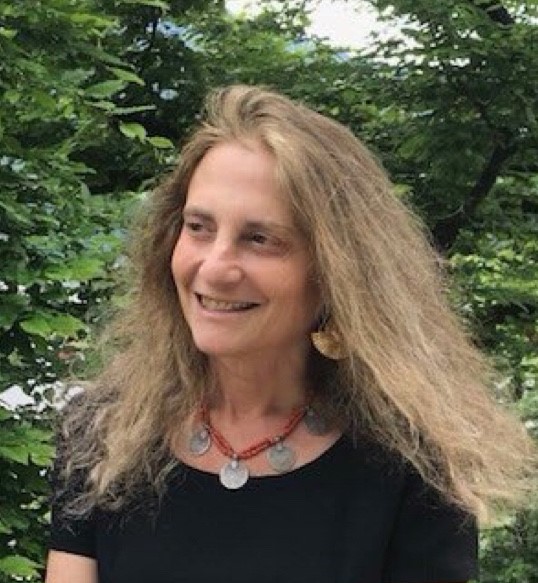|
|
|
Invited speakers
by Matilde FONTANIN University “La Sapienza”, Rome & University of Trieste
Biography Matilde Fontanin is currently a PhD student at Rome University “La Sapienza” (Italy). With a background education in linguistics, she has been a librarian since 1995 and fell in love with the idea of the library as intermediator to information from the very beginning of her experience as academic librarian (at Udine first, and then Trieste). She started teaching English to librarians in 2001 and has developed since interests in e-elearning, information literacy and recently open access. Active in Continuing Professional Development, she is a member of the Board for Professional Development of AIB, the Italian Library Association, and served two terms on IFLA SC CPDWL, a Committee where she remains as consultant. Her current research is on the role that libraries and librarians can play in teaching critical thinking in an age of Fake News – she presented her first steps at BOBCATSSS2019. Though fond of the digital, she finds free space for creative thinking whenever she logs off to ride her bicycle, an almost daily habit. Abstract “Fake news” has become a buzzword, but what does it mean? Understood, apparently, by everyone, the concept is the object of multidisciplinary studies. Admittedly, the first realm it touches is the news, that is journalist and political communication, but any discipline dealing with information cannot help but come to terms with a phenomenon which, ephemeral as it may be, has a great impact on our onlife experience. Though already existing in the analogic world, fake news rises ethical questions after its inception in the digital realm. As for any innovation, it is only after the discovery phase is over that humans reflect on its impact on civil society. Cybernetics, founded by Norbert Wiener, induced Père Dubarle to wonder whether the new science, combined with the theory of games, would eventually generate a machine à gouverner, “to supply the obvious inadequacy of the brain when the latter is concerned with the customary machinery of politics”. These words, written decades ago, could still build the basis for an ethical reflection. Since fake news affects information, the question is to what extent it affects a profession whose mission is to offer “an online collection of digital objects of assured quality” as the IFLA/UNESCO Manifesto for Digital Libraries states. Should LIS professionals deal with truth only? What is the meaning of true as opposed to fake? To what lengths should librarians strive to “verify” information? Where is the thin line between selection and censorship? And, above all, who says it is their task at all? After attempting a broad definition based on current literature, the focus of this talk is on the impact that the spread of fake news, disinformation and misinformation has on LIS professionals in terms of their mission, code of ethics, competences and professional requirements. "Should you believe what you see?" by Vincent NOZICK Paris-Est Marne-la-Vallée University
Biography Vincent Nozick received his Ph.D. in computer sciences in 2006 from Universite Paris-Est Marne-la-Vallée, France. In 2006, he was laureate of a Lavoisier fellowship for a post-doc position in the laboratory of Prof. Hideo Saito, Keio University, Japan. Since 2008, he has been a tenured "maître de conférences" at Universite Paris-Est Marne-la-Vallée, France. He held a "délégation CNRS" position from 2016 to 2018 at the Japanese French Laboratory for Informatics (JFLI), at Keio University, NII and The University Tokyo, Japan. He is in charge of the Master2 of imagery sciences at Universite Paris-Est Marne-la-Vallée, France. His current research focuses on both digital image and video forensics and geometric algebra. Abstract Over the last decades, the popularization of smartphones and the growth of social networks have made digital images and videos very common digital objects. According to several reports, almost two billion pictures are uploaded everyday on the internet. This tremendous use of digital images has been followed by a rise of techniques to alter their contents, using editing software like Photoshop for instance. Unlike digital images, editing videos has been a time-consuming and painstaking task due to the complexity of the editing process. However, the generation of falsified digital content has seen a significant leap forward with the development of deep learning techniques. Indeed, artificial intelligence technology greatly simplified the process of creating falsified content and enhanced the quality of the falsifications. Today, the danger of fake news is widely acknowledged. In a context where more than 100 million hours of video content are watched daily on social networks, the spread of fake news raises more and more concerns. Indeed, these fake images and videos can affect various domains, from press, social networks and politics to visio-conference systems and video surveillance. In this context, some efforts are conducted by the research community to design some tools to prevent fake news to be released. Digital image and video forensics is an emerging research field that attempt to detect these image falsifications and restore trust towards digital imagery. During this talk, I will give an overview of some common falsification tools and their evolution in regard to the emergence of deep learning. We will observe how the human brain can be defenseless against computer generated contents and can be fooled if it drops its vigilance. Then, I will present of a set of digital image and video forensics methods to detect these forgeries. These techniques are based on computer programs where most of them can distinguish tiny details and pixel variation over the image that are imperceptible for the human eye. We also may see the limit of technology to protect us against malicious contains. "Real or false news? How can anyone make the difference." by Rose-Marie FARINELLA
Biography A journalist-turned-teacher, Rose-Marie Farinella is working in a primary school in Taninges, in the French Alps. For her Media and Information Literacy curriculum, she received a global award during the GAPMIL Week, organized by UNESCO, in Jamaïca (2017), a european award during the SaferInternet4EU, organized by the European Commission, in Brussels (2018) and 3 national awards: at the «National Congress of digital culture and MIL » in Lyon (2017), during “the French annual congress for Journalism” in Tours (2016), at the “Innovative Teacher’s Forum”, organized by the “Café Pédagogique” in Paris (2016). She participated in the writing of a collective book « Des têtes bien faites/ Défense de l’esprit critique» (Well-made heads / Defense of the critical mind) published by PUF in January 2019, under the supervision of Nicolas Gauvrit and Sylvain Delouvée. Abstract The challenge of her Media and Information Literacy project is to give keys to all pupils to distinguish real news from false news on the Internet and on social networks generally speaking. The aim is to sharpen students' critical thinking skills so that they are not manipulated by others but also by themselves while being aware of certain cognitive biases. The aim is also to help them to become cyber citizen who will block and fight racist, xenophobic ideas, conspiracy theories unfortunately widely spreading on the web. At the end of the schoolyear, pupils receive a “Hoaxbuster diploma” (i.e. a false information tracker diploma) in a ceremony during which they take an oath on the mouse of their computer: “Before forwarding a piece of information, I will always check it”. She is experimenting her pedagogical scenario in a primary school for the sixth year with 10 year-old pupils. She created this curriculum for such young pupils, because most of them, are using the internet. They are subject to the same risks as their elders.She wants to give them intellectual self-defense tools, before they become teenagers -a vulnerable age- when they risk to be tempted by reductive discourses from all kinds of manipulators. |





